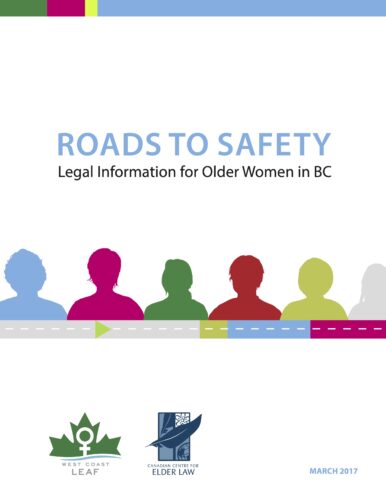
Roads to Safety
In 2016, West Coast LEAF and the Canadian Centre for Elder Law created Roads to Safety, a legal handbook for older women in BC, as well as multilingual wallet cards listing sources of support. The handbook covers legal issues that older women might deal with when they have experienced violence. It explains rights and options, using stories to illustrate the legal information.
Older women have told us that they face many different types of legal challenges, and that it can be hard to find clear legal information that applies to their situation. That’s why our handbook covers many legal topics:
- Emergency information and safety planning
- Decision-making rights
- Immigration rights
- Getting legal help
- Income assistance
- Applying for a pension
- Applying for housing supports
- Protection orders and peace bonds
- Keeping grandchildren safe
- Steps to protect yourself from financial abuse
- Property division after separation
Some information in the handbook and wallet cards might now be out of date.
Roads to Safety handbook (PDF, 1 MB)
Download the wallet cards:
- English wallet card listing general services (PDF, 521 KB)
- English wallet card listing specialized services for Indigenous women (PDF, 520 KB)
- Arabic wallet card (PDF, 142 KB)
- Chinese (Simplified) wallet card (PDF, 199 KB)
- Chinese (Traditional) wallet card (PDF, 203 KB)
- Filipino (Tagalog) wallet card (PDF, 122 KB)
- French wallet card (PDF, 126 KB)
- Hindi wallet card (PDF, 155 KB)
- Persian (Farsi) wallet card (PDF, 142 KB)
- Punjabi wallet card (PDF, 135 KB)
- Spanish wallet card (PDF, 125 KB)
- Urdu wallet card (PDF, 419 KB)
- Vietnamese wallet card (PDF, 131 KB)
Acknowledgements
Our sincere thanks to all those who contributed to the development of Roads to Safety. We also thank our generous project funder, the BC Council to Reduce Elder Abuse, and the BC Association of Community Response Networks, who supported us to reprint these materials (with minor revisions to the handbook) in 2017.
